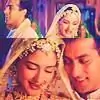The abiding image of today's episode was the very last one: Jalal and Bairam Khan in a tight embrace, silhouetted against the sky. It warmed my heart as nothing else in all these nearly 5 weeks of Jodha Akbar, for in one fell sweep, it blew away the miasma of siyasat, of power gained and power lost, of cynical games played with the lives of others. All of that will undoubtedly return, and in force, but for this one brief moment, the air was pure and fresh, and the heart prevailed.
The final encounter between Jalal and his Khan Baba, which was far more emotional than anything Bairam Khan would ever have permitted his pupil to indulge in - he does not allow even tears at the death of Jalal's father - did not only redeem the former Wazir-e-Aala. It also saved Jalal from doing something he would never have been able to get over for the rest of his life, destroying the man who, whatever his present failings, had provided him with a father figure for all of his growing years. It was his Khan Baba's final, priceless gift to his pupil.
The end scene also proved, beyond all doubt, that Jalal not only has a heart, but that he does not need a Jodha to teach him how to use it. I had written earlier that he has an admirable trait: he is grateful for any and all kindnesses done to him. This is remarkable and rare in a king, for kings have a highly developed sense of entitlement, and see the loyalty and devotion of their followers as no more than their due; gratitude is out of the question. Not so with Jalal, and this is an innate quality that has always been there.
This was more in evidence today than ever before in the debate over how to tackle Bairam Khan's rebellion. Jalal seems lost as his heart struggles with his head , while Mahaam Anga, her eyes as hard as agates, and Hamida Banu Begum, looking exactly like the Before part of a Saridon ad for headaches😉, fight for his soul. Sandwiched between them, their clashing arguments washing over him, Jalal agonizes, brow furrowed in helpless indecision.
I could not understand exactly what his Ammijaan wants him to do - go and fall on his Khan Baba's neck and beg his forgiveness? For a woman who has been an Empress, even if only briefly, she seems to have no notion of the imperatives of state power and the bounden duties of an emperor. Perhaps it comes from her not being of royal blood, but she sounds all the time like the 16th century version of a Salvation Army preacher😉.
Mahaam Anga is predictable, but she is far from sure of her hold on Jalal, for she is rattled when Ammijaan surges forth from the wings, plonks herself behind her son, and collars his left ear for her homilies. As Jalal, already haunted by old memories of his Khan Baba, wavers, Mahaam Anga's eyes mirror near despair.
It takes all the finely calculated eloquence of Ruqaiya - whose rousing address is, in its way, as cleverly tailored for its one man audience as Mark Antony's classic Friends, Romans, countrymen speech in Shakespeare's Julius Caesar was to the Roman crowd - to bring Jalal round to putting the needs of imperial power over the gratitude and affection of a lifetime. As he rides out of the city gates in full battle regalia, after a full-throated battle cry,Yalgaar! , it does seem that the head has won out at last, and he is, fully and without reservations, as ruthless as an emperor needs to be.
But beyond the gates stands Bairam Khan, arms akimbo like one awaiting crucifixion, and everything is turned upside down in an instant. The Ruqaiya-Mahaam Anga combo might have swayed Jalal for a while, but never forever. The real Jalal is the one who drops his sword in an instant, kneels next to his mentor and holds him close.
When he does so, and as he speaks of his Khan Baba of old, the accumulated bitterness of the last few weeks is washed away in a tide of emotion that heals them both. The inevitable parting will no longer be a corrosive one. And looking ahead, when Bairam Khan is killed by an old enemy on the way to Mecca, there will be no unbearable burden of guilt on Jalal's soul.
Mahaam Anga-Ruqaiya: I was waiting for Ruqaiya's promised chaal to get back at Mahaam Anga after the Zaheer fiasco, but the CVs apparently forgot about that. Now they have metamorphosised into a pair of most unlikely allies, against Hamida Banu Begum for the present, and even more so against Jodha when the time comes, for they will soon sense her threat potential.
For now, I enjoyed the candid cynicism with which Ruqaiya bares her real motive in coaxing Jalal to take Bairam Khan head on, and the instant pact between her and Mahaam Anga, which was strongly reminiscent of the one of 1941 between Hitler and Stalin. It will probably last just as long!
The new Ruqaiya: She is clearly much better looking than the old one. Her face is smooth in its lacquered perfection, and she has all the nazakat needed for the Malika-e-Hind. But her face, with the light eyes, looks like a cold mask, and she seems to be far more overtly arrogant and unfeeling than the old one was.
The old Ruqaiya was a creature both strong and insecure, arrogant and vulnerable.On Tuesday last, she was so convincing in her misery and her frailities, in the prison and then with Jalal in their bedchamber.There was also a nervous gentleness in the way she handled Jalal then. I somehow cannot see the stylish mask of a face that this new one has bringing out those nuances. The Ruqaiya during the hunt was already harder.
They are also making her out, suddenly, to be a political power, collecting the jaziya and lecturing Jalal on the duties and responsibilities of kingship. Gone is any evidence of the chronic insecurity about her hold on him that was most sharply in evidence on Tuesday, which was rooted in her childlessness. She now looks every inch the confident, favourite First Consort, flaunting the Malika-e-Hind title that was never used before. This Ruqaiya does not seem likely to seek reaffirmations from her lord and master about her being his most chaheti begum. The Malika-e-Hind would have no such doubts. What has happened all of a sudden?
It seems likely that the CVs, had, without really meaning to do so, created a fresh and fascinating Ruqaiya, intelligent, tantalizing, and Jalal's trusted partner in life, but yet with many vulnerabilities and secret griefs, unable to let him know what she feels for him for fear of losing the closeness to him that she cannot live without. What they apparently need, in their standard issue 'good girl- bad boy about to turn good' scenario, is a bad girl to set off the good girl's goodness. And the prime candidate for this is, who else, Ruqaiya.
I am thus more than half afraid, looking at the new Ruqaiya of the last two days, that they will soon leach out everything that made the character fascinating and vulnerable at the same time, and reduce her to a standard issue negative female from any TV soap. Like Bahar in Mughal-e-Azam, even after allowing for her being the seniormost queen. That would be a very great pity. Let us hope she escapes that sad fate!
Jodha-Ruqaiya: Well, the keenly awaited Jodha-Jalal encounter proved, not unexpectedly, to be a no show, as the two of them circled that tree so many times that it seemed impossible for him not to hear the sound of her payals, or even to step on the end of her trailing odhni! But still I enjoyed it, especially Jodha's quick-wittedness in scaring the deer away with smoke (she has apparently done a Girl Guides course in camping, including lighting a fire without a match!😉)
In this, the first of her successful encounters with Ruqaiya, an indirect one, she was helped greatly by Ruqaiya taking an inordinate amount of time for her shot. If she does this all the time, she would not be able to hit even a slow moving elephant!
What was intriguing here was the detachment with which Jalal views the whole proceeding, commenting, in an unconscious echo of Arjuna's maxim in the Mahabharata, that her focus must be total and she must, in some way, become one with the target. He also senses the smoke - there is something in the air, the winds are changing, he says - even before he sees the smouldering twigs. When he does see them, his eyes light up in genuine amusement and appreciation of the trick played on Ruqaiya.
In the second one encounter, about the jaziya, Jodha had all the best lines, though entirely predictable ones, and she rounded it off by the grand gesture of handing over a priceless necklace in payment of the tax for the whole lot of the pilgrims. Apparently the Malika-e-Hind is also a closet chartered accountant, seeing that she does a lightning calculation and sets off the value of the necklace against a whole year's jaziya (for how many pilgrims?😉
Jodha : They are getting some things about her just right. I liked two things about Jodha yesterday.
One was the calm dignity, firm but free of arrogance, with which she put that cheeky chunari seller in her place, capping that by draping the expensive chunari - fit only for the Mughal Shahenshah's begums - over her maid's head. It was a splendid put down, much better than chewing the woman out,and she added a solid retort about Mughal shehzadis and Rajputanis to sew everything up. Of course it was the 150 mohras that spoke the loudest, but she handled the whole impeccably.
She handles the jaziya encounter with Ruqaiya with the same clear-eyed, non-confrontational firmness, and emerged the winner. She will handle Mahaam Anga the same way when the time comes for that.
Second, I liked the open, childlike (not childish) way in which she laughed when Motibai ends up with mud all over her face and over that 150 mohra chunari. It was like a carefree little girl, and it was charming.
That Jodha treats her maid as her equal is admirable, but there has to be a limit to that. I did not like the way Motibai bargained for that chunari like a housewife in a fish bazaar, without waiting so see what Jodha felt about it at all. She should keep the rank and dignity of her mistress in mind. It looked bad, and it only highlighted the need for some staff discipline. The Mughal court is far more hierarchical and formal, and if Jodha treats the servants there in the same way as in Amer, and tries to befriend all and sundry, she will soon be in the suds. A queen must be kind, but a bit aloof and dignified as well; otherwise the staff will start being presumptuous.
The constant refrain in this serial is about how Jodha will change Jalal for the better. But it is equally important for her to change herself where it is necessary. As I wrote elsewhere, Jodha could, so far, afford to be as simple and straightforward as she is because she has never faced any serious dilemmas,any great danger, any great tragedies, in her life as Jalal has. She has never been as lonely as he is, so lonely that he does not even know that he is lonely. Lonely in that he has no one with whom he can connect with the certitude that the person is not out to use him one way or the other. He is the closest of all to Ruqaiya, and still, when she praises his appearance, he is sure she wants something from him.
Jodha can thus afford to see things in black white, to run to save a pigeon or a deer, and to lecture her family on the Rajput code of honour.
The first time she is going to be pulled both ways is about Sujamal, and the beginnings of this were evident at the Yamadwitiya ceremony. When he joins up with the enemy to redress what he sees as a great injustice done to him, Jodha will understand that there need not be one clear right and one clear wrong, and she will suffer with him. As Jalal suffers when Zaheer is blinded and later dies, when Takhtmal is murdered, and when so many other things go very badly wrong despite him.
Jodha will have to grow up, to learn that life is not so simple, that there are competing pressures that have to be balanced, and that for an emperor, his empire and its needs come before all else. That often the choice is not between the good and the bad, but between the lesser of two wrongs. That the imperatives of statecraft often cannot be subjected to personal concepts of right and wrong, or to those of human sympathy.
Unless she does this, she will never be able to get to the inner Jalal, and her influence over him, which is the keystone of this tale, will never reach the critical mass needed to change him.
Questions for the day: Jodha is shown celebrating what is apparently Deepavali in Amer. The Yamadwitiya is the day after Deepavali, and is popularly known in North India as Bhaidooj. She is carried in a palki all the way from Amer, with a longish halt in Bhanpur, to Mathura. How does she manage to reach Mathura for the Yamadwitiya?
And how does Sujamal, with whom she has no way of communicating , also turn up there on the dot?
Joke of the day: Suryabhan Singh, on hearing of the falling out between Jalal and Bairam Khan, proclaiming that Yeh Jalal ko aur bhi (?!?) kamzoor bana dega, and so it would be no big deal for him to defeat Jalal and fulfill his promise to Jodha about, what else, getting her Jalal's head. I almost fell off my chair laughing. Famous last words!!
Shyamala B.Cowsik




































68